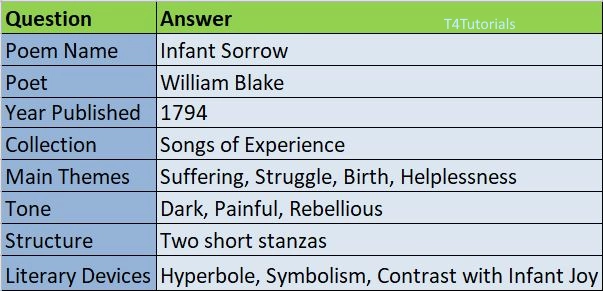Summary:
Infant Sorrow is a contrasting companion poem to Infant Joy, appearing in Songs of Experience (1794). Instead of celebrating birth as a moment of happiness, this poem depicts birth as a struggle, filled with sorrow and pain.
- The speaker is a newborn child who feels trapped and miserable upon entering the world.
- The mother groans in pain during childbirth, while the father weeps, indicating that the birth is not a moment of joy but one of suffering.
- The baby is helpless yet rebellious, struggling against the world, leaping, crying, and writhing in discomfort.
- The final image of the baby sulking on the mother’s breast suggests a sense of defeat and quiet suffering.
- This poem reflects Blake’s “Experience” perspective, where the world is harsh, restrictive, and full of suffering from the very moment of birth.
Unlike Infant Joy, which celebrates innocence and happiness, Infant Sorrow portrays birth as a harsh and sorrowful entry into an already difficult world

10
Score: 0
Attempted: 0/10
Subscribe
Score: 0
Attempted: 0/10
Subscribe
| Question | Answer |
| Poem Name | Infant Sorrow |
| Poet | William Blake |
| Year Published | 1794 |
| Collection | Songs of Experience |
| Main Themes | Suffering, Struggle, Birth, Helplessness |
| Tone | Dark, Painful, Rebellious |
| Structure | Two short stanzas |
| Literary Devices | Hyperbole, Symbolism, Contrast with Infant Joy |